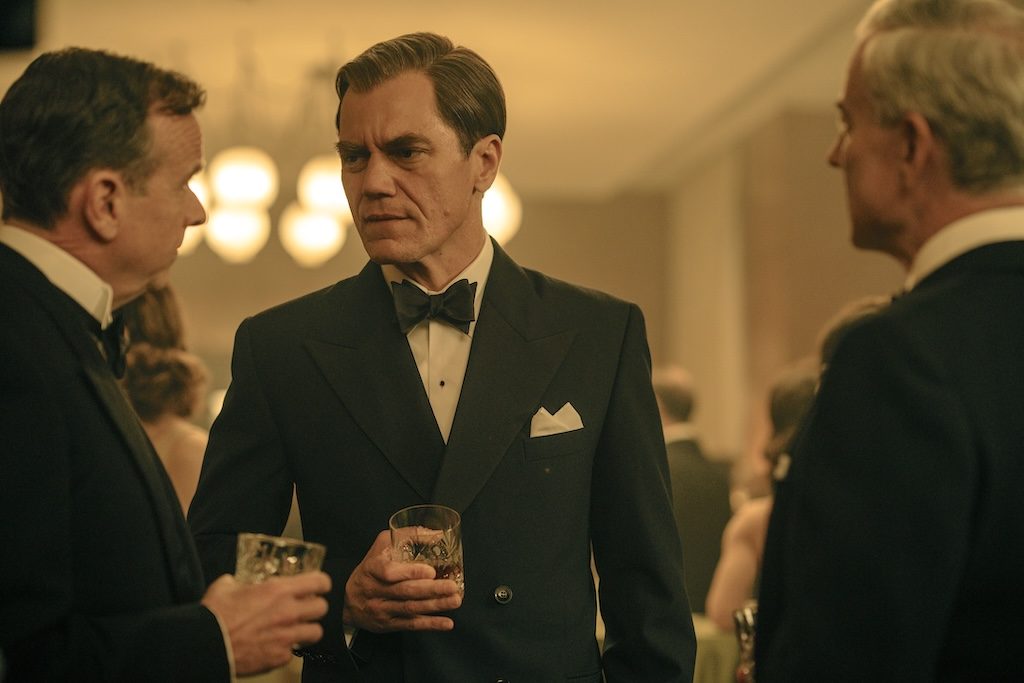An In-Depth Conversation with James Vanderbilt: Deconstructing the Complexities of “Nuremberg”

After Word War II ended in 1945, Europe was in tatters, still shell-shocked by the atrocities performed by the Nazis. The easiest way to deal with these war criminals might have been to confine them to the annals of history so the continent could heal and rebuild. However, the allies insisted that war trials would take place, law history be written, and legal justice served in Nuremberg, Germany.
Based on the Jack El-Hai’s novel The Nazi and the Psychiatrist, the film version of Nuremberg tells the gripping story of army psychiatrist Lt. Col. Douglas Kelley (Rami Malek) as he evaluates the psychological fitness of 22 detained Nazi officials, including former Reichsmarschall Hermann Göring (Russell Crowe). Kelley later published his works as 22 Cells At Nuremberg. Moreover, Supreme Court Associate Justice Robert H. Jackson (Michael Shannon) takes on the mammoth task of prosecuting the men responsible for the crimes of the Third Reich, and develop the foundational legal and ethical framework for this unprecedented international tribunal.
Bringing this story to the screen took well over a decade and involved poring over extensive transcripts, footage, and other accounts. Writer/ director James Vanderbilt (Zodiac, Murder Mystery) shares his thoughts on the process with Creative Screenwriting Magazine.

Sgt. Howie Triest (Leo Woodall) & James Vanderbilt. Photo courtesy of Sony Pictures Classics
This project is particularly captivating, as you endeavor to distill three story mountains into a single narrative. I’ve categorized them as follows: one is a study of law and the creation of case law; the second explores human psychology; and the third investigates ideology. How did you approach these elements?
I absolutely adore that description! You’ve articulated it beautifully, and I might just have to steal that phrasing! The idea of “three different mountains” captures the essence of the journey I undertook while writing.
You drew inspiration from the initial book, The Nazi and the Psychiatrist, alongside Kelley’s work. With such a vast foundation, how did you navigate the conceptualization of your screenplay? What guided the pre-adaptation process?
The journey began with Jack Al-Hai’s The Nazi and the Psychiatrist. I was fortunate enough to preview his book proposal before its release, as I knew him personally. He shared it while he was still writing, and it comprised a succinct overview — five to six pages encapsulating the complex interplay between psychiatrist Dr. Douglas M. Kelley and Nazi leader Hermann Göring. Their intricate relationship, filled with cunning and strategy, absolutely captivated me. How they met each other, how they were trying to get one over on each other, and how they affected each other.
That was the fastest I’ve ever committed to a project. The material was so compelling, and I quickly realized how little I actually knew about this historical drama. I’m perpetually drawn to narratives that peel back the layers of monumental events, revealing the underlying questions of morality and the nature of evil. To think that one of the most powerful Nazis was subjected to psychological analysis was both staggering and thrilling.
Once I committed, my research journey began in earnest, and I relished every moment. There’s a profound confidence that comes from research, whether it involves true stories or fiction. However, the pre-adaptation phase for Nuremberg was particularly extensive. During this exploration, I encountered the compelling story of Associate Supreme Court Justice Robert Jackson.

Supreme Court Justice Robert H. Jackson (Michael Shannon) Photo courtesy of Sony Classics
Talk more about how Supreme Court Associate Justice Robert H. Jackson became an instrumental part of Nuremberg.
Absolutely — his narrative is crucial. Interestingly, he’s not a prominent feature in Jack’s book, yet his influence on the Nuremberg Trials is monumental. Initially, I assumed that once World War II concluded, the trial of the Nazis was a foregone conclusion. To my surprise, I learned that very few people supported the idea of trials in the first place. The U.S. Army was actually quite reluctant, and there was a standing order from Churchill and Roosevelt to have the top-tier Nazis executed within 48 hours of their capture.
But Jackson made a courageous stand against this notion. He argued that such actions would set a dangerous precedent. He emphasized that it couldn’t merely be a U.S.-led effort; an international coalition was necessary to ensure justice — a groundbreaking tribunal that had never before been conceived. He understood the importance of including the French, British, and Russians, even amid the rising tensions of the Cold War. Jackson even took a leave from his court position, traveled to Nuremberg, and assumed the role of chief U.S. prosecutor.
For me, this revelation broadened the scope of my film. While I initially believed my narrative would revolve solely around the psychiatrist’s interactions with prisoners, the courtroom dynamic offered a thrilling complementary storyline showcasing legal complexities and moral dilemmas. Additionally, I stumbled upon Sgt. Howie Triest (Leo Woodall) the translator, which added yet another layer to this evolving narrative landscape.
It sounds as though your adaptation process was a mix of excitement and challenge.
The challenge of adaptation typically revolves around a lot of subtraction — transforming a 350-page book into a two-hour movie or a 120-page screenplay. However, with Nuremberg, instead of contracting, the material just kept flourishing, which was thrilling, yet daunting as a writer. The richness of the source material was extraordinary, but posed significant obstacles in effectively structuring the screenplay.
I had a firm grasp of the historical timelines and the moments when these characters intersected, but determining how to best present those interactions on screen was tricky. Timing became a pivotal component; figuring out when characters like Kelley and Jackson would first encounter one another — would it be on page 10 or page 60? The delicate dance of unveiling those connections as a screenwriter became an intricate balancing act.
[More: How Screenwriter James Vanderbilt Created ‘Murder Mystery’]
Your approach transcends simply reducing characters to the archetypal villains. It emphasizes the dimensions of human vanity and ego. What were their ulterior motives?
That’s an incredibly important point. The motivations of these characters are intricately layered. While it’s easy to label the Nazis as the embodiment of evil, it’s crucial to explore the human dynamics that underpin these personas. Dr. Kelley, for example, wasn’t just studying Göring’s psyche; he grappled with his own aspirations of being the psychiatrist who engaged with such a notorious figure to bolster his career.
The psychological toll that comes from trying to comprehend and analyze such profound evil cannot be understated. This moral complexity —this internal struggle — plays a key role in the unfolding narrative. It’s a dynamic exploration of what propels someone to confront or seek understanding of evil on such a grand scale.
For me, it was about coming at all of them as human beings and knowing they’re all after something. Kelley had the highest living ranking Nazi dropped in his lap, It was an opportunity to dissect the nature of evil and if he can write a book about it afterwards and make a name for himself, so much the better.
Göring was charming, funny, self-effacing and magnetic. He had all of these qualities that you don’t associate with Nazis. Somebody once described him as the best dinner party guest you could ever have. I also knew of the relationship that he and Kelley end up having begins as transactional, but I think becomes something that affects both men in ways neither of them could have predicted. I knew Göring had to be able to seduce Kelley to a certain extent. And for that to be believable, he had to be able to seduce the audience too.
Jackson was setting legal precedent for war crime trials.

Douglas Kelley (Rami Malek) & Howie Triest (Leo Woodall) Photo courtesy of Sony Classics.
How did you dissipate the darkest aspects of Nuremberg so that you didn’t alienate and overwhelm the audience?
The movies I grew up loving that dealt with serious historical stuff were JFK, Apollo 13 and Glory. They’re thrillers in lots of ways. They’re a journey to take the audience on. It’s not just about writing a polemic. You needed light moments in order for the dark moments to land. We also deal with darkness through humor. The Godfather is extremely funny with lines like “Leave the gun, take the cannoli.”
In the first half of Nuremberg you get to know and like these characters, are charmed and taken in by them. That’s when the worm turns. Then we get to the really dark stuff. You care about them and you’re emotionally invested in their journeys.
Jack El-Hai’s Book feels like a two-hander between Kelley and Göring. How did you make the story more cinematic?
What I love about the film is that we were able to give it a sense of scope and a sense of stakes. It was really important to us that it didn’t feel that the Göring-Kelley relationship is the heart of the movie. During the research, I tried to follow the story where it wanted to go. It ended up wanting to be in the courtroom. There was so much inherent drama there. I didn’t necessarily know the size and scope of what the movie was, but as it wanted to grow, we tried to grow with it.
Tell us more about Hermann Göring.
He was a real award winner. He grew up in poverty and worked his way up the military career ladder to become a pilot and lead the Red Baron squadron. That’s why I think he felt like an everyman to many people. Showing him as a human being doesn’t excuse his actions even though he’s presented as a three-dimensional character – gregarious and charming. Ultimately, that does not take away from the horrors that he was responsible for. If anything, I think it makes it more horrific.
What were some of your biggest writing challenges?
It was really the structure during the beginning of how am I going to fit ten pounds of grain into a five-pound bag. Once I knew it was going to be a three-hander, I had more confidence in the writing. I just followed the events without using flashbacks.
The film begins on the day Göring surrendered and end on the radio station scene. Everything has to fit within these within these two pieces. How would this information be doled out? I really want it to be the cinematic journey as opposed to a stage play or a polemic.
What are your final thoughts on Nuremberg? What do you want the audience to take away?
I’m hopeful, even though there’s some darkness to it. There’s hope in telling the story because it was a moment in time where a lot of different people from a lot of different countries came together to choose justice over vengeance . When I started writing it 13 years ago, I felt it was timely then. I certainly think it’s timely now. And I think, unfortunately, it will be timely in the future.
This film isn’t merely a recounting of historical fact; it’s an exploration of the human condition, the pursuit of justice, and the moral conundrums inherent in confronting evil.
Join the Discussion!
Related Articles
Browse our Videos for Sale
[woocommerce_products_carousel_all_in_one template="compact.css" all_items="88" show_only="id" products="" ordering="random" categories="115" tags="" show_title="false" show_description="false" allow_shortcodes="false" show_price="false" show_category="false" show_tags="false" show_add_to_cart_button="false" show_more_button="false" show_more_items_button="false" show_featured_image="true" image_source="thumbnail" image_height="100" image_width="100" items_to_show_mobiles="3" items_to_show_tablets="6" items_to_show="6" slide_by="1" margin="0" loop="true" stop_on_hover="true" auto_play="true" auto_play_timeout="1200" auto_play_speed="1600" nav="false" nav_speed="800" dots="false" dots_speed="800" lazy_load="false" mouse_drag="true" mouse_wheel="true" touch_drag="true" easing="linear" auto_height="true"]










You must be logged in to post a comment Login